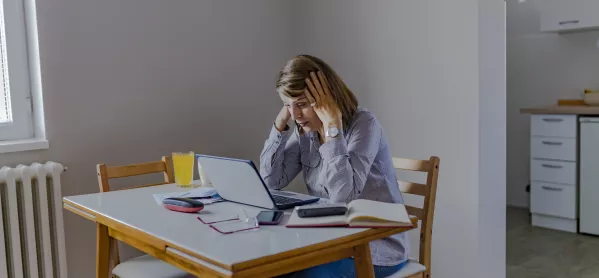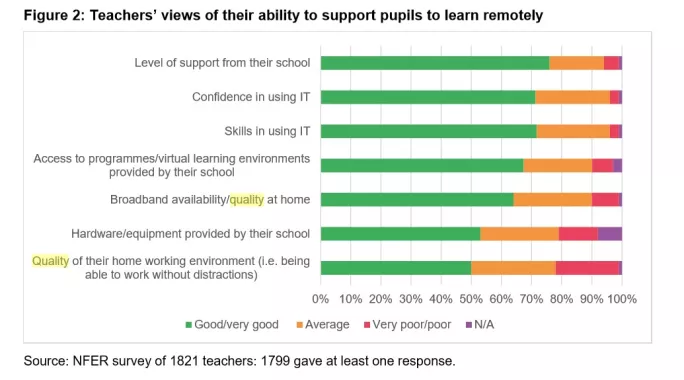More than a fifth of teachers describe the quality of their home working environment and their ability to work without distractions as “very poor or poor”, according to new research.
The National Foundation for Educational Research surveyed more than 3,000 teachers and heads last month, when schools had been shut for almost eight weeks and most were relying on remote learning.
More than a fifth of respondents said the IT equipment provided by the school was either poor or very poor, while around 10 per cent said their home broadband quality or availability was poor or very poor. And the same amount said they lacked access to virtual learning environments provided by their school.
Sutton Trust: Teachers ‘need support for online lessons’
Coronavirus: Legal action for online learning equality
School closures: A guide to the tech to help you cope
The report states: “In general, teachers feel well-equipped for providing remote learning support for pupils, both in terms of the support they are receiving from their schools, and their personal confidence and skills in using IT.
“However, one-fifth of teachers describe the quality of their home working environment and their ability to work without distractions as very poor/poor.”
The report, published today, looks mainly at factors affecting pupil engagement. It found that where teachers have a “good quality working environment at home” they have a seven percentage point increase in the likelihood of their disadvantaged pupils being “highly engaged”.
And teachers who set activities that involve consolidating previous learning or revising have a five percentage point higher level of engagement, the report says.
It also found that teachers aged between 20 and 29 are likely to have lower pupil engagement and a lower likelihood of their disadvantaged pupils being highly engaged.
Teachers who feel well supported by their school, and teachers who teach key stage 5, are also likely to have higher levels of pupil engagement, says the report.
Carole Willis, NFER chief executive, said: “There is reinforcement of the crucial role of leaders in this situation, with a positive association between teachers feeling well-supported by their school leaders and pupil engagement. This is particularly significant for young teachers, with less experience.”
Other findings were that:
- Only 55 per cent of parents fully engage with home learning.
- Teachers reported being in regular contact with, on average, 60 per cent of their pupils.
- Teachers in the most deprived schools report 30 per cent of pupils returning their last piece of work, compared to 49 per cent of pupils in the least deprived schools.
- School leaders believe that around one-third of pupils (29-37 per cent) are not engaging with set work at all.
- The majority of teachers (90 per cent) believe that their pupils are doing less work than they would usually expect at this time of year.
- School leaders report that 23 per cent of their school’s pupils have limited access to IT at home.
Mary Bousted, joint-general secretary of the NEU teaching union, said: “There isn’t a school leader in the country who isn’t deeply worried about the outlook for their disadvantaged students and what additional issues their families may face because of Covid-19.
“We simply haven’t seen from government the bold steps or empathy in response to the disadvantage and harm caused by the disruption from this pandemic.”
A Department for Education spokesperson said: “We will do whatever we can to make sure no child, whatever their background, falls behind as a result of coronavirus.
“The government has already committed over £100 million to support children to learn at home, and pupil premium funding at the highest ever rate per pupil continues to be paid to help schools support their disadvantaged pupils.”






